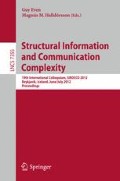Abstract
Greedy (geometric) routing is an important paradigm for routing in communication networks. It uses an embedding of the nodes of the network into points of a metric space (e.g.,  ) equipped with a distance function (e.g., the Euclidean distance ℓ2) and uses as address of each node the coordinates of the corresponding point. The embedding has particular properties so that the routing decision for a packet is taken greedily based only on the addresses of the current node, its neighbors, and the destination node and the distances of the corresponding points. In this way, there is no need to keep routing tables at the nodes. Embeddings that allow for this functionality are called greedy embeddings. Even though greedy embeddings do exist for several metric spaces and distance functions, they usually result in paths of high stretch, i.e., significantly longer than the corresponding shortest paths.
) equipped with a distance function (e.g., the Euclidean distance ℓ2) and uses as address of each node the coordinates of the corresponding point. The embedding has particular properties so that the routing decision for a packet is taken greedily based only on the addresses of the current node, its neighbors, and the destination node and the distances of the corresponding points. In this way, there is no need to keep routing tables at the nodes. Embeddings that allow for this functionality are called greedy embeddings. Even though greedy embeddings do exist for several metric spaces and distance functions, they usually result in paths of high stretch, i.e., significantly longer than the corresponding shortest paths.
In this paper, we show that greedy embeddings in low-dimensional Euclidean spaces necessarily have high stretch. In particular, greedy embeddings of n-node graphs with optimal stretch requires at least Ω(n) dimensions for distance ℓ2. This result disproves a conjecture by Maymounkov (2006) stating that greedy embeddings of optimal stretch are possible in Euclidean spaces with polylogarithmic number of dimensions. Furthermore, we present trade-offs between the stretch and the number of dimensions of the host Euclidean space. Our results imply that every greedy embedding into a Euclidean space with polylogarithmic number of dimensions (and Euclidean distance) has stretch \(\Omega\left(\frac{\log n}{\log\log n}\right)\). We extend this result for a distance function used by an O(logn)-stretch greedy embedding presented by Flury, Pemmaraju, and Wattenhofer (2009). Our lower bound implies that their embedding has almost best possible stretch.
This work was partially supported by the EC-funded STREP project EULER.
Access this chapter
Tax calculation will be finalised at checkout
Purchases are for personal use only
Preview
Unable to display preview. Download preview PDF.
References
Alon, N.: Tools from higher algebra. In: Graham, R.L., Grötschel, M., Lovász, L. (eds.) Handbook of Combinatorics, vol. 2, pp. 287–324. MIT Press, Cambridge (1996)
Alon, N., Badoiu, M., Demaine, E.D., Farach-Colton, M., Hajiaghayi, M., Sidiropoulos, A.: Ordinal embeddings of minimum relaxation: general properties, trees, and ultrametrics. ACM Transactions on Algorithms 4(4), art. 46 (2008)
Alon, N., Frankl, P., Rödl, V.: Geometrical realization of set systems and probabilistic communication complexity. In: Proceedings of the 26th Annual Symposium on Foundations of Computer Science (FOCS), pp. 277–280 (1985)
Awerbuch, B., Peleg, D.: Sparse partitions. In: Proceedings of the 30th Annual IEEE Symposium on Foundations of Computer Science (FOCS), pp. 503–513 (1990)
Boguna, M., Papadopoulos, F., Krioukov, D.: Sustaining the internet with hyperbolic mapping. Nature Communications 1, art. 62 (2010)
Eppstein, D., Goodrich, M.T.: Succinct greedy geometric routing using hyperbolic geometry. IEEE Transactions on Computers 60(11), 1571–1580 (2011)
Erdös, P., Sachs, H.: Reguläre Graphen gegebener Taillenweite mit minimaler Knotenzahl. Wiss. Z. Martin-Luther-Univ. Halle-Wittenberg Math.-Natur. Reihe 12, 251–257 (1963)
Flury, R., Pemmaraju, S.V., Wattenhofer, R.: Greedy routing with bounded stretch. In: Proceedings of the 28th IEEE International Conference on Computer Communications (INFOCOM), pp. 1737–1745 (2009)
Forster, J.: A linear lower bound on the unbounded error probabilistic communication complexity. Journal of Computer and System Sciences 65(4), 612–625 (2002)
Kleinberg, R.: Geographic routing using hyperbolic space. In: Proceedings of the 26th IEEE International Conference on Computer Communications (INFOCOM), pp. 1902–1909 (2007)
Linial, N., London, E., Rabinovich, Y.: The geometry of graphs and some of its algorithmic applications. Combinatorica 15(2), 215–245 (1995)
Matoušek, J.: Lectures on Discrete Geometry. Graduate Texts in Mathematics. Springer (2002)
Maymounkov, P.: Greedy embeddings, trees, and Euclidean vs. Lobachevsky geometry (2006) (manuscript)
Moitra, A., Leighton, T.: Some results on greedy embeddings in metric spaces. Discrete & Computational Geometry 44(3), 686–705 (2010)
Papadimitriou, C.H., Ratajczak, D.: On a conjecture related to geometric routing. Theoretical Computer Science 341(1), 3–14 (2005)
Peleg, D., Upfal, E.: A trade-off between space and efficiency for routing tables. Journal of the ACM 36(3), 510–530 (1989)
Warren, H.E.: Lower bounds for approximation by nonlinear manifolds. Transactions of the American Mathematical Society 138(1), 167–178 (1968)
Author information
Authors and Affiliations
Editor information
Editors and Affiliations
Rights and permissions
Copyright information
© 2012 Springer-Verlag Berlin Heidelberg
About this paper
Cite this paper
Caragiannis, I., Kalaitzis, C. (2012). Space Lower Bounds for Low-Stretch Greedy Embeddings. In: Even, G., Halldórsson, M.M. (eds) Structural Information and Communication Complexity. SIROCCO 2012. Lecture Notes in Computer Science, vol 7355. Springer, Berlin, Heidelberg. https://doi.org/10.1007/978-3-642-31104-8_1
Download citation
DOI: https://doi.org/10.1007/978-3-642-31104-8_1
Publisher Name: Springer, Berlin, Heidelberg
Print ISBN: 978-3-642-31103-1
Online ISBN: 978-3-642-31104-8
eBook Packages: Computer ScienceComputer Science (R0)

